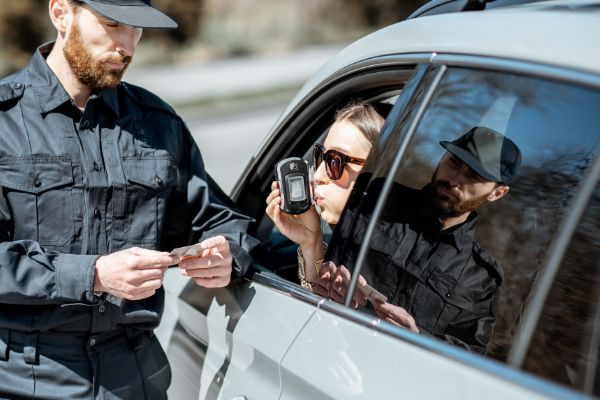
You are pulled over, suspected of drinking and driving. You are given the option of a breathalyzer and take it during a traffic stop. You await the results and wonder, is breathalyzer accuracy enough for a DUI charge in Maryland?
Learn about breathalyzer accuracy and what you need to know when faced with a DUI charge in Maryland. Whether it’s from a sobriety checkpoint or a traffic stop, DUI accusations can be unsettling. Get the info you need to know about the accuracy of breathalyzers, their role in a DUI conviction, and if waiting for a blood test is a better option for DUI defense and protecting your rights.
Breathalyzer Technology: How Do They Work
Breathalyzers operate based on alcohol-specific chemical reactions. When a person exhales into a breathalzer, present ethanol molecules in their breath react with a mixture of chemicals within the device, producing an electric current. This current is then measured and converted into a blood alcohol concentration (BAC) reading.
As technology evolves, so do breathalyzer devices. Advanced sensor technologies and improved algorithms continue to be developed to improve the accuracy of readings in both portable and stationary devices. Some breathalyzer devices now feature multiple sensors to minimize the impact of external factors and increase reliability.
Breathalyzer Calibration and Operating Procedures
To maximize the accuracy of breathalyzer readings, strict adherence to regular calibration protocols is essential. Law enforcement agencies must prioritize routine maintenance to ensure the consistent performance of their devices and avoid inaccurate or misleading readings.
Additionally, it is important that police officers are aware of how to correctly administer a breathalyzer test, whether roadside or back at the station. This uniformity can help minimize the risk of errors or incorrect readings. However, this uniformity is not always found and can help with determining fault with the reading in DUI cases.
Portable vs. Stationary Breathalyzers vs. Blood Tests
There are portable breathalyzer devices, often used during roadside tests, and these may have limitations compared to stationary breathalyzers found in police stations. Based on whether you use a breathalyzer roadside (portable) or wait until you’re back at the station (likely a stationary reading) will impact how the defense of your DUI case is handled.
Neither a portable breathalyzer nor a stationary breathalyzer compares to the accuracy of a blood test. There has been found to be an average of a 15% difference in some cases between a breathalyzer vs a blood test. This difference in readings can make the difference between a DUI charge and not.
So, Are Breathalyzers Always Accurate?
While breathalyzer technology is advancing, various factors can affect its accuracy during readings. Calibration plays a pivotal role; improper calibration can lead to skewed readings. Additionally, external elements such as environmental conditions and the individual’s physiological factors can influence results.
This means that the surrounding air, any smoke or other chemicals, your own enzymes, and more can influence the readings. Improper or irregular calibration can lead the readings to be off and provide inaccurate results.
Legal Considerations: Can You Dismiss Breathalyzer Results in Court
Breathalyzer results often serve as critical evidence in DUI cases. For most charges, a breathalyzer is the first piece of evidence to prove a drunk driver. However, breathalyzer readings can be dismissed based on several factors.
Improper administration of tests, adherence to legal protocols, and more can all help void the readings of a breathalyzer. Legal professionals must ensure that the testing process complies with established standards to validate the results in court. Yourattorney can help navigate the process for determining the accuracy and responsibility of these findings.
Working with Your Lawyer to Challenge Breathalyzer Results
Challenging the accuracy of breathalyzer results is not uncommon in legal proceedings. Lawyers may question the device’s maintenance, calibration, or the qualifications of the administering officer. The more experience your defense lawyer has, the better they can determine if your breathalyzer reading is valid for dismissal.
The accuracy of breathalyzers in DUI testing is always going to be up for debate, as much of the technology hinders exterior factors. Understanding the intricacies of the technology, legal considerations, and advancements in breathalyzer devices can all help in DUI cases.
If you’re concerned about your DUI charge and think your breathalyzer results were faulty, request a free consult from DUI defense lawyers in Baltimore at Saller Law. With our local knowledge, we have the tools needed to discover if your charges are able to be upheld in court.
Breathalyzer FAQs
Breathalyzer tests are subject to various factors that may impact accuracy, such as calibration issues, individual physiology, or external substances. Understanding the limitations of breathalyzer tests is essential for defending DUI cases in Maryland and reducing your DUI charges.
If you are facing DUI charges in Maryland, you have the right to challenge breathalyzer results. Common defense strategies may include questioning the device’s calibration, the qualifications of the operator, or arguing that medical conditions or external factors influenced the accuracy of the test. Your DUI defense lawyer can assist in putting together your case and pulling evidence to aid you.
Maryland law enforcement may use both breathalyzer and blood tests to measure blood alcohol content (BAC). While breathalyzer tests provide immediate results, blood tests may be considered more accurate.
You may not always have the option to choose between a breathalyzer and a blood test, as law enforcement procedures and circumstances can dictate the type of test administered. It is important to know your rights at a sobriety check point or traffic stop to make the right move for your safety and rights.
-
In every case, we work directly with clients from the beginning to the end of a case. We hear about many lawyers who take the money and their client interaction doesn’t take priority. We know that an ideal outcome must come from collaboration with our clients. This approach ensures that everybody gets a fair deal – that our clients are never run over by what can be an unfair system. If you have been charged or are being investigated, it is absolutely crucial to begin defending as soon as possible. We encourage you to get in touch.
Get Your Free Consult

